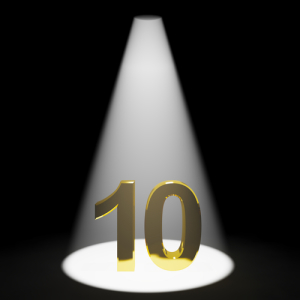Surveying Ten Years Of Top Internet Law Developments (Forbes Cross-Post)

Photo credit: Gold 10th 3d Number // ShutterStock
2006: Barrett v. Rosenthal
This case involved 47 USC 230, the 1996 federal law saying that websites aren’t liable for third party content. In Barrett v. Rosenthal, the California Supreme Court adopted an expansive view of Section 230’s protection for online actors (not just websites). The case stood out because of the importance of the California Supreme Court’s rulings to California-based Internet companies and the potential repercussions if the case had turned out differently. However, because its result echoed other Section 230 rulings, the case doesn’t get a lot of attention any more.
2007: Utah Tries to Tax Keyword Advertising Into Oblivion
In the mid-2000s, the Utah legislature went on a binge of trying to regulate the Internet. Most of their Internet-related legislation was flat-out terrible, but few of their misguided efforts had the global implications as their 2007 law banning keyword advertising. This was a venal attempt to tax the Internet. The idea was to motivate trademark owners to pay Utah money to register their trademarks in a new registry, and marks so registered then would be banned from being used as advertising keywords. Nearly a decade later, it may be hard to believe anyone would try such an over-the-top and socially depraved stunt. Fortunately for the Internet, when word got out about Utah’s law, the blowback was so severe that Utah repealed the law and eventually gave up.
2008: Cartoon Network v. CSC (the “Cablevision” case)
This Second Circuit ruling has indeed cast a long shadow over Internet copyright law. It has created several situations where online copies might exist but don’t constitute copyright infringement, which in turn has sparked some entrepreneurship. Sadly, I’m not sure what’s left of this ruling after the Supreme Court’s 2014 Aereo ruling, but the ruling still has a central place in my Internet Law reader.
2009: FTC Endorsement Guidelines for Bloggers
The FTC hates ads masquerading as editorial content, and their decades-long quest to squelch it led to 2009 guidance telling bloggers to stop accepting undisclosed freebies because the resulting blog posts were effectively ads. The guidelines remain as puzzling and crazy in 2016 as they were in 2009, but the FTC keeps enforcing them anyway.
2010: Wikileaks
A great cautionary tale of how governments try to censor content, and how such censorship efforts have become more difficult due to the Internet. Wikileaks is still going strong in 2016 even though our democratic government tried hard to kill it.
2011: Regulators Broke the Internet
This particular item needs a little more explanation. I wrote:
We’ve always known that regulators could combat bad online activity by working “up the chain,” i.e., by making upstream service providers liable for the bad acts or obligated to cut off the activity. However, for the most part, we’ve shared a tacit understanding that systematically going up the chain was a “nuclear” option–it would fix the specific problem but only at significant collateral cost that, on balance, makes the option unattractive.
I think we’ll look back at 2011 as the year that tacit understanding broke down. In 2011, regulators around the world showed a seemingly insatiable demand for working up the chain. Although we in the USA like to think we’re different from other repressive regimes, the evidence suggests otherwise.
Examples I gave at the time included: Middle Eastern governments turning off the Internet during Arab Spring, ICE’s campaign of ex parte seizures of domain names, Internet access providers giving “strikes” to users for copyright infringements (“graduated response”), rulings holding web designers and ad networks liable for their customers’ activities, rightsowners getting ex parte seizure orders in court, and SOPA/PIPA. By 2016, it’s fair to say that this trend has only gotten worse and the Internet is being slowly broken, piece by piece.
2012: SOPA’s Failure
The demise of SOPA was a shockingly effective moment in our participatory democracy and one of the few times the Internet community successfully fought back for its rights. Yet, the policies underlying SOPA have continued to burrow their way into our regulatory scheme, so the short-term win has not fundamentally changed the unavoidable outcome.
2013: the NSA Scandals
We’re still reeling from the revelations by Edward Snowden. Most fundamentally, the NSA (combined with other US government agencies) has become the most invasive government surveillance machine ever deployed in human history. Yet, even as we learn more details about just how invasive, lawless and ineffectual that surveillance apparatus is, we’ve made virtually no headway in curbing it.
2014: Sony Hack and Its Fallout
A massive hack that further demonized North Korea, laid bare a company’s deepest secrets, caused unexpected problems for Mississippi’s state attorney general, and reminded all of us that there really is no meaningful cybersecurity.
A close #2 that year was Europe’s “Right to be Forgotten,” a topic which is still roiling the world and threatens to shard the Internet into country-specific Internets.
2015: Presidential politics and Silicon Valley as scourge and savior
DC politicians treat Silicon Valley as their campaign ATMs, as terrorism-enablers, and as idiots who have failed to conjure up “magic golden keys” for backdooring encryption or magic algorithms that would surgically drone-strike terrorists’ online personae. Yet the same DC politicians wonder why the Silicon Valley is so politically apathetic and disengaged.
Perhaps in a future post, I’ll do another post to look holistically at the top Internet Law developments over the past decade and then compare it to my annual lists to see how easy or hard it is to spot top historical developments in the moment. For now, for my blog’s 10 year anniversary, last year I did a post “How Internet Law and IP Law Have Evolved.”